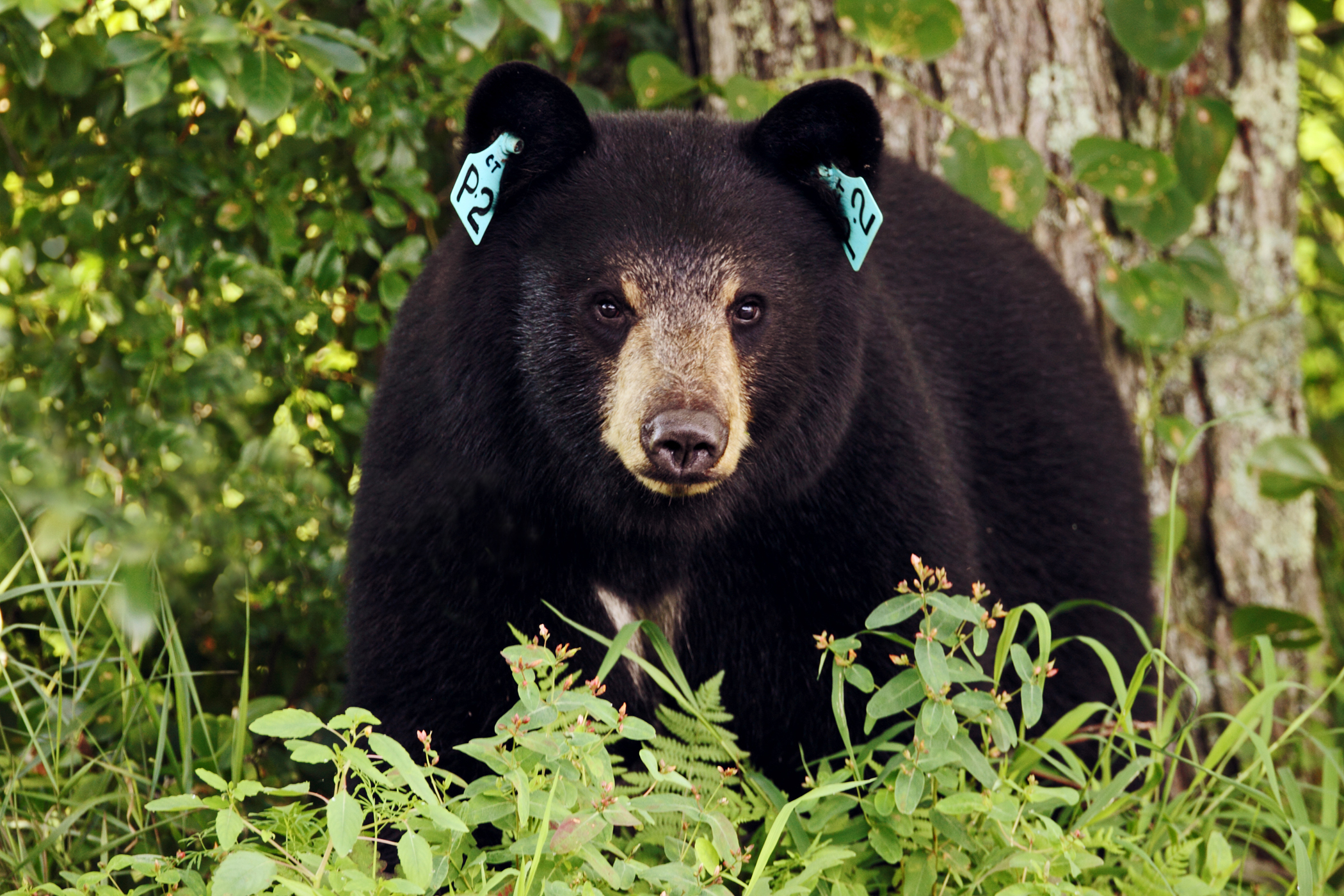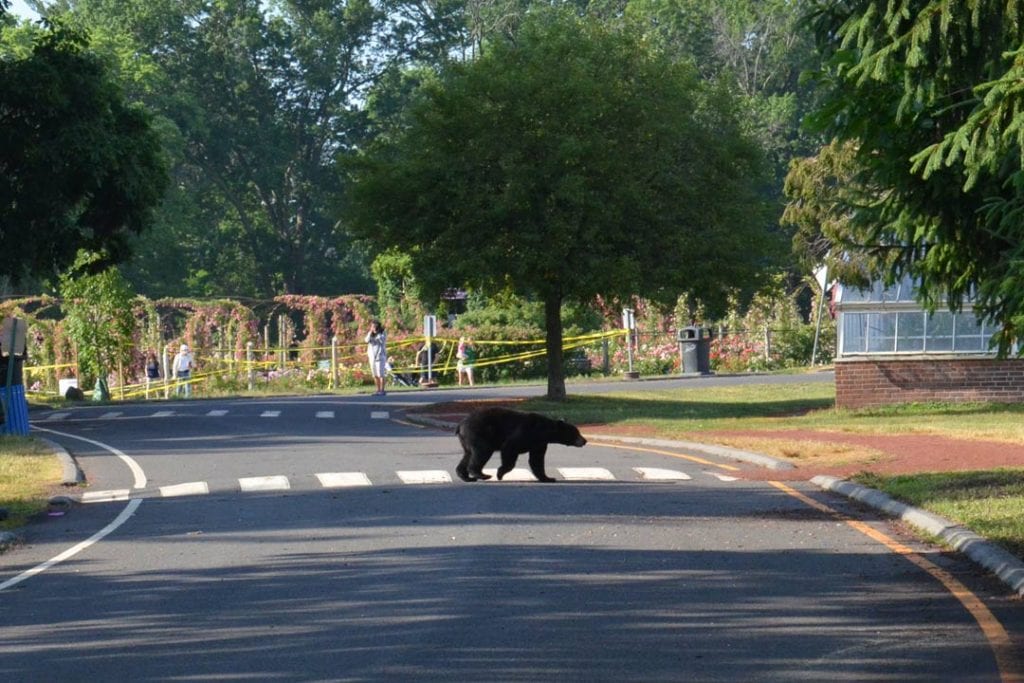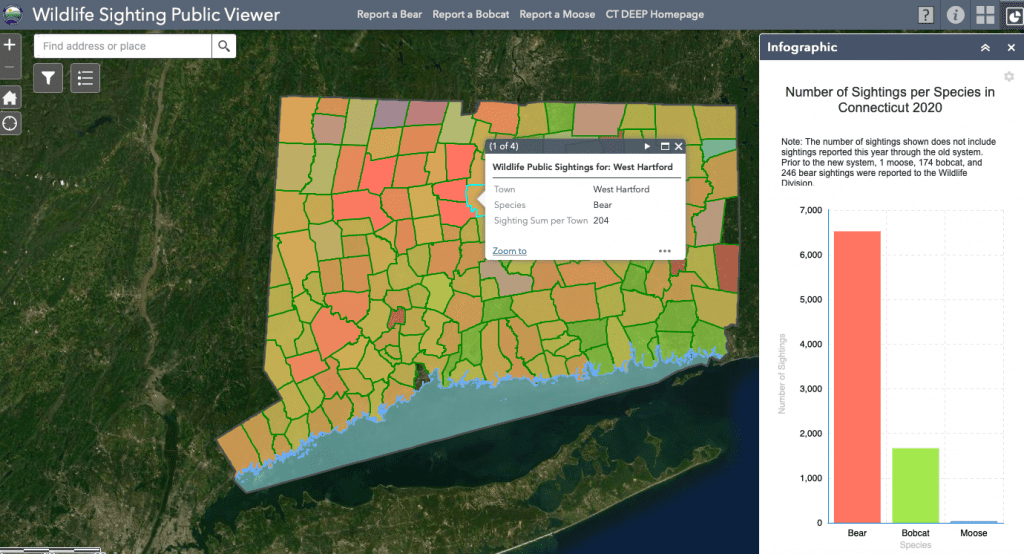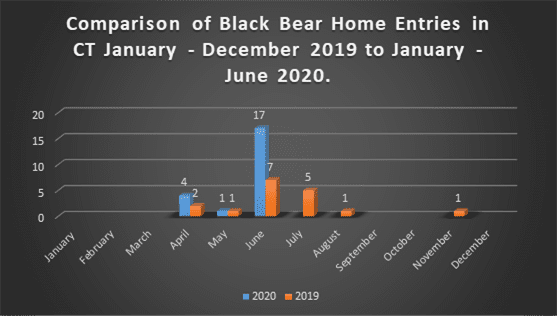DEEP Notes Black Bear Interactions on the Rise

Audio By Carbonatix

A common misconception is that a tagged bear is a problem bear, and a bear with two ear tags was caught on two different occasions because it was causing problems. Actually, every bear receives two ear tags (one in each ear) the first time it is handled by DEEP. Most tagged bears have not been caught as problem bears, but rather as part of a project researching the state’s population. Photo credit: Paul J. Fusco/DEEP Wildlife Division (we-ha.com file photo)
The Department of Energy and Environmental Protection (DEEP) has reported an unprecedented number of bears entering homes in 2020, and in West Hartford there have already been more than 200 sightings of bears reported this year.

A bear using the crosswalk in Elizabeth Park on Sunday, June 28. Photo credit: Bill Gleason (courtesy photo, we-ha.com file photo)
By Ronni Newton
The Department of Energy and Environmental Protection (DEEP) is advising state residents of things that can be done to minimize habituation of bears, noting that there has been an unprecedented increase in the number of interactions between black bears and people in the state.
In West Hartford, since DEEP instituted a new reporting system on its website earlier this year, there have been 204 bear sightings reported.

Screeenshot, DEEP website
Exact year-to-year comparative data was not available, but from April 2018-April 2019, there were 199 bears reported in West Hartford.
Bears have been seen in all parts of town, not just in neighborhoods that border the MDC reservoir property. In late June, a bear was photographed strolling through Elizabeth Park.
While interactions between people and bears have not been reported in West Hartford thus far this year, DEEP has noted that they are on an unprecedented rise in some communities where bears have entered homes or injured leashed as well as unleashed dogs.
In early July, a West Hartford woman’s dog was one of three dogs in the care of a dog walker in the McLean Game Refuge in Simsbury when a bear attacked, injuring the man and one of the dogs. The West Hartford woman’s dog, Lucy, Golden Retriever, fled the scene dragging her leash and was missing overnight but found unharmed, the following day after an extensive search of the area.
Through July 8, DEEP reported 25 bears had entered homes in the state – already more than in any other year – and the agency anticipates the total number of home entries is on track to triple the average in 2018 and 2019. In 2109 there were 17 home entries, DEEP noted, and this year there were 17 in June alone.

Courtesy DEEP
The rise in encounters prompted DEEP to send out a news release with suggestions about how to reduce encounters and conflicts with bears, which can become habituated and food-conditioned when they have regular access to “human-associated food” including birdseed, trash, and pet food.
“As the bear population continues to grow and expand its range, and bears become increasingly food conditioned, conflicts with humans will continue to increase, and food-conditioned bears pose a greater risk to public safety and often cause more property damage to houses, cars, pets, and livestock,” the news release states.
DEEP Wildlife Division Director Jenny Dickson warns against feeding bears, even unintentionally. “Bears that are attracted to homes by easily-accessible foods lose their fear of humans. Such bears spend more time in neighborhoods and near people, increasing risks to public safety, the likelihood of property damage, and the possibility that the bears may be hit and killed by vehicles,” she said in a statement.
If you do encounter a bear either in your yard, or while hiking, the best response is to yell or make other loud noises, Dickson said, and if you are in your yard, go inside the house, garage, or other structure. Do not attempt to get closer to the bear, and if it fails to retreat on its own, leave the area slowly.
If you have nowhere to go and the bear continues to approach, you should go on the offsite by shouting, having your arms, and throwing sticks or rocks, DEEP suggests.
Dogs should be kept o a short leash while hiking and should not be allowed to roam free.
To reduce encounters and potential conflicts, DEEP advises:
- NEVER feed bears.
- Do not feed birds in the spring (starting in late March), summer, and early fall. Clean up spilled seed from the ground.
- Store garbage in secure, airtight containers inside a garage or storage area. Adding ammonia to cans and bags will reduce odors that attract bears. Periodically clean garbage cans with ammonia to reduce residual odor. Garbage for pickup should be put outside the morning of collection and not the night before.
- Do not store leftover bird seed or recyclables in a porch or screened sunroom as bears can smell these items and will rip screens to get at them.
- Supervise dogs at all times when outside. Keep dogs on a short leash when walking and hiking. A roaming dog might be perceived as a threat to a bear or its cubs. (Dogs are required to be on a leash when visiting State Parks, State Forests, and Wildlife Management Areas. Check dog and leash regulations for town properties, land trusts, and other public properties before heading to those areas.)
- Do not leave pet food outdoors or feed pets outside.
- Use electric fencing to protect beehives, agricultural crops, berry bushes, chickens, and other livestock.
- Keep barbecue grills clean. Store grills inside a garage or shed.
- Avoid placing meat scraps or sweet foods, such as fruit and fruit peels, in compost piles.
Bears that appear to be aggressive to people should be reported immediately through DEEP’s 24-hour dispatch line at 860-424-3333.
More information can also be found on DEEP’s “Living With Black Bears website.
DEEP continues to monitor the black bear population and also asks that those who see bears report them through the DEEP website or by calling the Wildlife Division at 860-424-3011. If available, information that can be provided about the color of ear tags or the number on the tag is especially valuable.
Every bear receives two tags – one in each ear – the first time it is handled by DEEP, as part of a research project. The tags do not mean that a bear is a problem.
The color of the tag corresponds to the year. In 2020, bears have received blue tags. Bears received green tags in 2019 and orange tags in 2018.
Like what you see here? Click here to subscribe to We-Ha’s newsletter so you’ll always be in the know about what’s happening in West Hartford! Click the blue button below to become a supporter of We-Ha.com and our efforts to continue producing quality journalism.



